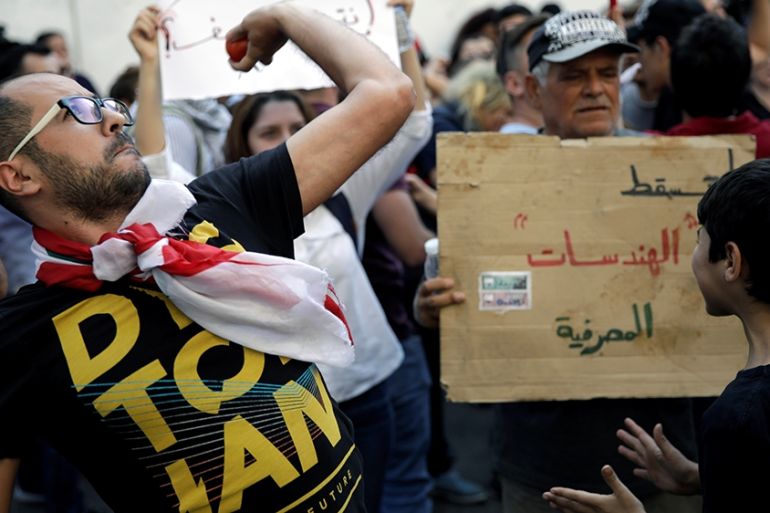Lebanon’s central bank chief tries to calm fears over bank system
Trying to restore confidence in country’s banking system, central bank head says capital controls are not in the cards.

Beirut, Lebanon – With nationwide protests entering their 26th consecutive day on Monday, Lebanon‘s central bank chief set out to reinstill confidence in the country’s beleaguered banking system, assuring depositors their funds are safe and that there will be no restrictions on the flow of foreign currency in and out of the country.
In his first news conference since protests broke out in mid-October, Banque du Liban Governor Riad Salameh highlighted the importance of remittances to Lebanon’s crisis-ridden economy, saying that no curbs in the form of capital controls would be placed on the free movement of money.
Keep reading
list of 3 itemsLebanon students skip school as protesters eye state institutions
Lebanon protesters seek to shut down key state institutions
“It’s not possible that those who send money here would not be able to take it again freely, so capital controls are not in place and will not be put in place,” he said.
Since reopening on November 1 following a two-week closure in the wake of protests, many Lebanese banks have limited the amount of United States dollars that depositors could withdraw.
Mohammad Zbeeb, a veteran Lebanese business journalist, and Dan Azzi, former CEO of the Lebanese subsidiary of Standard Chartered Bank, have claimed that such restrictions are only being put on small depositors while those with bigger balances are able to transfer large sums out of the country unimpeded.
Following Salameh’s address, Azzi tweeted: “History will not be kind on anyone who allowed insiders and big money to escape, while the person with no wasta [power and influence] was locked up in the system. If you think the October #LebanonProtests were huge, wait until they find out … and they will.”
Chaotic scenes
There have been chaotic scenes at some banks, with clients filming videos of themselves angrily rejecting demands to pay in US dollars rather than the Lebanese pound, or being told they could not withdraw funds in dollars from their dollar accounts.
Just before Salameh’s televised press conference on Monday, Lebanon’s Union of Bank Employees announced they would go on strike starting Tuesday. Citing security risks to its members, the union said the walkout would go on “until the situation stabilises”.
Salameh said he was working to ease the restrictive measures implemented by banks, which he said were a result of the “difficult conditions” when they reopened.
“They opened without any political solutions to the crises and revolutions that Lebanon is witnessing,” he said. “These banks opened in a way where they took decisions that were a bit conservative, if we don’t want to say very conservative.”
Lebanon’s highly dollarized economy, in which everyday transactions take place in both US dollars and a Lebanese pound that is pegged to the greenback, has seen growth stagnate since war broke out in neighbouring Syria in 2011.
The crisis accelerated this year as vital remittances from Lebanese living and working abroad slowed, contributing to a shortage of foreign exchange. That in turn has pressured the country’s dollar peg, which was set at 1507.5 -1515 Lebanese pounds to the dollar, but is now nearing 2,000 Lebanese pounds to the US dollar on the unofficial market.
“If there are no dollars in the market then we don’t have an economy,” Salameh said during his address. He added that the main goal of the Banque du Liban or central bank during these “exceptional circumstances” is to maintain the stability of the dollar peg.
As Salameh spoke inside the central bank, scores of protesters gathered outside, calling for his resignation and demanding an end to costly financial engineering operations the central bank has carried out with private banks in order to secure dollars.
Salameh – whose last name translates as “safety” – has come to be seen by many as synonymous with monetary stability in Lebanon during his 27-year tenure. But having served that tenure alongside politicians who protestors are looking to ouster over economic mismanagement and corruption has put him increasingly in the line of fire.
“Thief, thief, Riad Salameh is a thief,” protesters outside the central bank building chanted. “Thieves, thieves, all of them are thieves.”
Salameh in his address notably sought to set himself apart from politicians managing the state’s finances.
“We funded, we didn’t spend. Those who spent are the ones who made budgets and oversaw them in the state, and we are not part of that – that must be clear for everyone,” he said. “We are securing funding for this country that we love, but we are not the ones spending it.”
Salameh declined to offer more details on who exactly is responsible for the crisis that Lebanon is currently in, saying there were more pressing matters. “At this point, we must face realistically these exceptional circumstances,” he said. “We hope that a government is formed as soon as possible, but we have taken measures so that nothing catastrophic happens.”
Salameh did not respond to a final question shouted by a journalist as he got up and walked off stage: “Is people’s money safe? Is people’s money safe?”
Lebanon has one of the highest debt levels as a share of economic output in the world, and it is on track to worsen, with the International Monetary Fund forecasting a double-digit fiscal deficit next year. The country’s antiquated, inefficient, unreliable and expensive oil-fuelled electricity sector is a $2bn annual drag on the country’s finances.